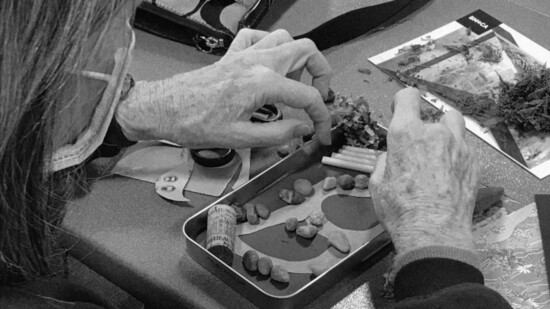Art transcends gender, age, ability, race and class. It bridges gaps that traditionally divide us and shines a light on topics often labeled as taboo or too controversial. Moreover, marginalized groups often find their voice or newfound freedom in the many mediums that make up art. Whether you are the creator or the beholder, the arts have something for you.
According to the World Health Organization, there are more than 55 million people living with dementia worldwide. Additionally, there is an irregularity of who this affects. Women have a higher risk of developing dementia and a higher rate of mortality as a result of it. Women also contribute up to 70% of care hours for individuals with dementia. Startling statistics such as these serve as proof of the growing need for support systems and programs like BMoCA’s SPARK!
The local contemporary art museum, BMoCA, has been a pillar of the community for decades. Attracting over 100,000 visitors per year, inclusivity and accessibility are at the forefront of the museum’s mission. However, these are not the only things that make BMoCA stand out. Senior Manager of Education, Zachary Davidson, explains: “We are a non-collecting institution, which is unique for a museum. Our focus is on presenting rotating exhibitions and programs that stimulate active participation in the global and local dialogue about contemporary art, instead of purchasing and collecting art. We support local artists in many ways, including through exhibitions and commissions, and strive to bring these programs to the Boulder community and surrounding underserved counties.”
One of the many free educational programs offered by BMoCA is SPARK!, a specialized initiative aimed at supporting the needs of individuals with cognitive diseases and their caregivers. Davidson also oversees the SPARK! program. Providing some details about SPARK!, Davidson explains that the organization “introduces local contemporary artists paired with constructive conversations about their involvement within the greater Colorado community." He continues, "Following this, our educators facilitate an art-making activity designed to pull from media and themes from the exhibition participants have just discussed.”
SPARK! began in 2013 and is subsidized in part by the Institute of Museum and Library
Services, the Maihaugen Foundation and the Scientific & Cultural Facilities District. Since the start, SPARK! has been providing creative workshops and free exhibition tours for individuals living with dementia and Alzheimer’s. By 2015, BMoCA established a partnership with the local Alzheimer’s Association, becoming the first museum in Colorado to offer SPARK!. This dynamism, banded together by the SPARK! Alliance, incites hope for those with memory loss as well as promise for the foundation of similar programs worldwide.
SPARK! and its successes stretch far beyond the four walls of BMoCA. The curriculum has been incorporated into assisted living facilities and public libraries across the Front Range area. “Due to the audience’s sensitive nature and impacts of the COVID-19 pandemic, it was important for BMoCA to take our time cultivating regional partnerships and building trust among this community, Davidson explains. "In 2022, BMoCA formed partnerships with five Jefferson County Libraries and two Douglas County assisted living facilities, which resulted in 31 program occurrences that served 124 participants.” These achievements and more would effectuate a program expansion that same year.
“People experiencing memory loss can have reactions to all forms of the arts that elicit and
prompt long-term memory access, granting them a chance to form connections with others
through sharing their experiences, either explicitly in a group discussion or implicitly with
producing artwork in a communal environment,” states Davidson. These sensory experiences have the potential to stimulate haptic memories for individuals which can be extremely rewarding and healing. As evident with SPARK!, building an effective and open discourse on the topic of memory loss and diseases can have huge benefits not only for those diagnosed but for their caregivers and family members as well.
